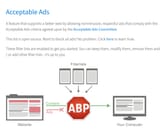Anonymous
8/22/2025, 7:27:15 AM
No.106343745
[Report]
>>106343768
>>106343804
>>106343925
>>106344167
>>106344186
>>106344268
>>106344285
>>106344384
>>106344538
>>106345305
>>106345482
>>106345516
>>106345556
>>106345708
>>106346322
>>106347146
>>106347630
>>106348704
>>106348849
>>106350149
Mozilla warns Germany could soon declare ad blockers illegal
> A recent ruling from Germany’s Federal Supreme Court (BGH) has revived a legal battle over whether browser-based ad blockers infringe copyright, raising fears about a potential ban of the tools in the country.
> The case stems from online media company Axel Springer’s lawsuit against Eyeo - the maker of the popular Adblock Plus browser extension.
> Axel Springer says that ad blockers threaten its revenue generation model and frames website execution inside web browsers as a copyright violation.
> This is grounded in the assertion that a website’s HTML/CSS is a protected computer program that an ad blocker intervenes in the in-memory execution structures (DOM, CSSOM, rendering tree), this constituting unlawful reproduction and modification.
> Previously, this claim was rejected by a lower-level court in Hamburg, but a new ruling by the BGH found the earlier dismissal flawed and overturned part of the appeal, sending the case back for examination.
> Mozilla’s Senior IP & Product Counsel, Daniel Nazer, delivered a warning last week, noting that due to the underlying technical background of the legal dispute, the ban could also impact other browser extensions and hinder users' choices.
> “There are many reasons, in addition to ad blocking, that users might want their browser or a browser extension to alter a webpage,” Nazer says, explaining that some causes could stem from the need "to improve accessibility, to evaluate accessibility, or to protect privacy."
> As per BGH’s ruling, Springer’s argument needs to be re-examined to determine if DOM, CSS, and bytecode count as a protected computer program and whether the ad blocker's modifications are lawful.
> “It cannot be excluded that the bytecode, or the code generated from it, is protected as a computer program, and that the ad blocker, ..........
more:
https://www.bleepingcomputer.com/news/legal/mozilla-warns-germany-could-soon-declare-ad-blockers-illegal/
https://archive.is/3RSZv
> The case stems from online media company Axel Springer’s lawsuit against Eyeo - the maker of the popular Adblock Plus browser extension.
> Axel Springer says that ad blockers threaten its revenue generation model and frames website execution inside web browsers as a copyright violation.
> This is grounded in the assertion that a website’s HTML/CSS is a protected computer program that an ad blocker intervenes in the in-memory execution structures (DOM, CSSOM, rendering tree), this constituting unlawful reproduction and modification.
> Previously, this claim was rejected by a lower-level court in Hamburg, but a new ruling by the BGH found the earlier dismissal flawed and overturned part of the appeal, sending the case back for examination.
> Mozilla’s Senior IP & Product Counsel, Daniel Nazer, delivered a warning last week, noting that due to the underlying technical background of the legal dispute, the ban could also impact other browser extensions and hinder users' choices.
> “There are many reasons, in addition to ad blocking, that users might want their browser or a browser extension to alter a webpage,” Nazer says, explaining that some causes could stem from the need "to improve accessibility, to evaluate accessibility, or to protect privacy."
> As per BGH’s ruling, Springer’s argument needs to be re-examined to determine if DOM, CSS, and bytecode count as a protected computer program and whether the ad blocker's modifications are lawful.
> “It cannot be excluded that the bytecode, or the code generated from it, is protected as a computer program, and that the ad blocker, ..........
more:
https://www.bleepingcomputer.com/news/legal/mozilla-warns-germany-could-soon-declare-ad-blockers-illegal/
https://archive.is/3RSZv










